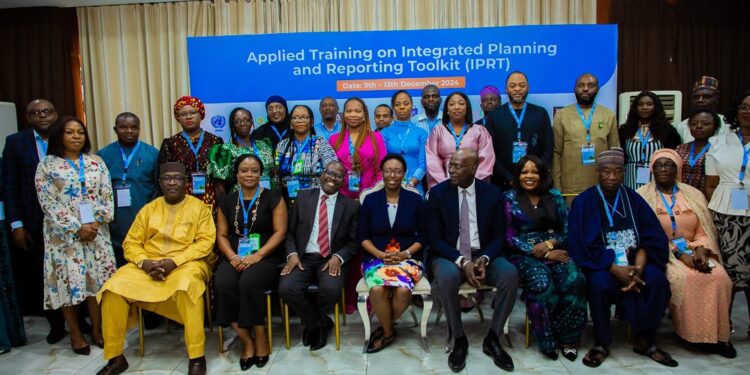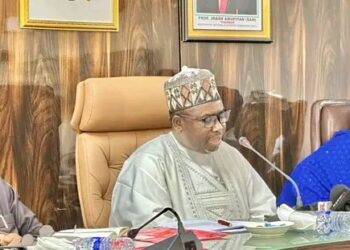In a significant step toward strengthening Nigeria’s development planning and reporting capacities, the Federal Government of Nigeria, in collaboration with the United Nations Economic Commission for Africa (UNECA) and the United Nations Development Programme (UNDP), has conducted an applied training on the Integrated Planning and Reporting Toolkit (IPRT). The training, which took place from December 9–13, 2024, aimed to enhance the alignment of Nigeria’s National Development Plan (NDP) with the global 2030 Agenda and the African Union’s Agenda 2063.
The training opened with remarks from Mr. Mohamed M. Fall, the UN Resident Coordinator and Humanitarian Coordinator in Nigeria, who emphasized the importance of harmonizing Nigeria’s development aspirations with global and regional agendas. “The Integrated Planning and Reporting Toolkit offers a powerful means to digitalize development plans, align them with the Sustainable Development Goals (SDGs) and Agenda 2063, and foster more efficient tracking and reporting mechanisms,” said Mr. Fall.
Representing the Senior Special Assistant to the President on SDGs (SSAP-SDGs), Dr. Bala Yunusa reaffirmed Nigeria’s commitment to integrating innovative tools like the IPRT into its development strategy. “This initiative highlights Nigeria’s determination to align its national priorities with global and regional frameworks. The IPRT will enable planners across federal and state levels to integrate budgets with development strategies and monitor progress in real-time,” Dr. Yunusa said.
The training was facilitated by Ms. Rose Keffas, who guided participants through the IPRT’s functionalities and its potential to revolutionize planning processes at federal and state levels.
In his remarks, Mr Felix Okonkwo the Director of Macroeconomic Analysis at the Ministry of Budget and Planning, emphasized the importance of the IPRT, noting that the training is both timely and apt as Nigeria prepares for its next National Development Plan. “The IPRT provides an essential framework to ensure coherence between our national, regional, and global development aspirations. It is a critical tool as we transition into the next phase of development planning,” he said.
Speaking on behalf of the United Nations Economic Commission for Africa (UNECA), Mrs. Oyebanke Abejirin commended Nigeria’s leadership in adopting the IPRT. “This innovative software was developed by UNECA to assist African countries in integrating the SDGs and Agenda 2063 into national development plans while ensuring harmonized reporting and evaluation,” she explained. She praised Nigeria’s proactive efforts, particularly through the Ministry of Budget and Economic Planning and the Office of the SSAP-SDGs, in addressing challenges such as climate change, post-COVID-19 recovery, and geopolitical disruptions.
Dr. Tony Muhumuza, Senior Economic Adviser for the United Nations Development Programme (UNDP) Nigeria, reiterated UNDP’s unwavering commitment to supporting Nigeria’s sustainable development journey. “UNDP is fully committed to working alongside the Government of Nigeria to harness innovative solutions like the IPRT. This toolkit offers an opportunity to embed sustainability into development planning and strengthen monitoring for measurable outcomes,” Dr. Muhumuza remarked.
Representing the Statistician General of the National Bureau of Statistics (NBS), Semiu Adeyemi Adeniran, Anne Ibrahim delivered remarks on the status of SDG indicators reporting. She outlined key achievements, including improved data collection mechanisms and partnerships that have bolstered Nigeria’s ability to track progress on SDG targets. “Nigeria has made significant strides in building robust statistical systems for SDG reporting,” she said. However, she acknowledged lingering challenges, such as funding gaps, capacity deficits, and data accessibility at sub-national levels. “We must leverage tools like the IPRT to address these challenges, ensuring data-driven decision-making and accountability,” she concluded.
Mrs. Olubunmi Oluwole, Assistant Director at AUDA-NEPAD Nigeria, emphasized the relevance of the IPRT for achieving Agenda 2063’s aspirations. “The IPRT is a vital instrument for aligning national development plans with regional and continental priorities. By leveraging this toolkit, Nigeria can enhance its capacity to plan, implement, and report on development initiatives,” she remarked. She further connected the IPRT to Nigeria’s Renewed Hope Agenda under President Bola Ahmed Tinubu, which prioritizes economic growth, infrastructure development, human capital development, and improved governance.
Participants left the workshop equipped to align the NDP (2021–2025) with the SDGs and Agenda 2063, integrate financial and development planning, and enhance monitoring and evaluation systems. This initiative is expected to accelerate Nigeria’s progress toward achieving sustainable development and addressing systemic challenges in planning and reporting.
This collaborative effort underscores Nigeria’s leadership in adopting innovative approaches to sustainable development, setting a benchmark for capacity-building across Africa.











